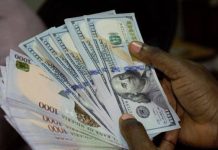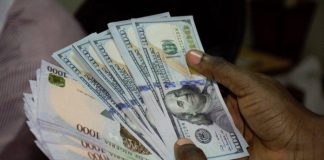The naira fell by roughly 1.7% at the start of the week, as demand and supply patterns indicate that the FX liquidity crisis in local currency markets has not improved.
Despite the Central Bank of Nigeria’s (CBN) efforts to increase US dollar volume in the foreign exchange market, the naira has remained severely under pressure. Analysts, however, predicted that the local currency would continue to suffer in the absence of explicit FX sales instructions to stimulate supply.
The naira fell by 1.69% against the US dollar to settle at ₦1,596.60, as reported by the FMDQ Securities Exchange platform for daily FX spot prices quotations.
The exchange rate direction suggests that the US dollar volume demanded by FX users overwhelmed the supply side, causing the local currency to be priced lower at the Nigerian autonomous foreign exchange market.
The naira needs to be defended as an import nation, analysts said, noting that other big economy like Japan has been boosting the currency against the dominant US dollar.
Meanwhile, gross external reserves continue to reduce after flurry of FX inflows lifted the balance to 18-month high early in August 2024. Nigeria’s foreign reserves dropped to $36.437 billion, and analysts said significant part of the amount has been pledged by government, and its agency for various deals.
The weak external reserves net position makes it difficult for the current CBN leadership to support the naira with constant FX sales interventions to boost the supply side.
Last week, the CBN said remittance flow through the official window hit a historic high of $553.0m in July. Based on the assessment of CBN’s historical data, the July remittance print is the highest inflow through the official channel in 11 months and represents a 130.0% year on year surge over the corresponding period in 2023.
In the parallel market, the naira depreciated by 0.31% to close at ₦1,605 per US dollar as invisible payment remain elevated, supported by Nigerians imports tastes.
After bearish performance, oil prices gained today amid reports of a production halt in Libya and after Israel and Hezbollah traded a barrage of strikes across the Lebanon border.
Brent prices rose by 2.75% to $81.19 and WTI prices increased by 3.01% to $77.08. Gold prices increased by 0.11% to $2,549.10 per ounce.













